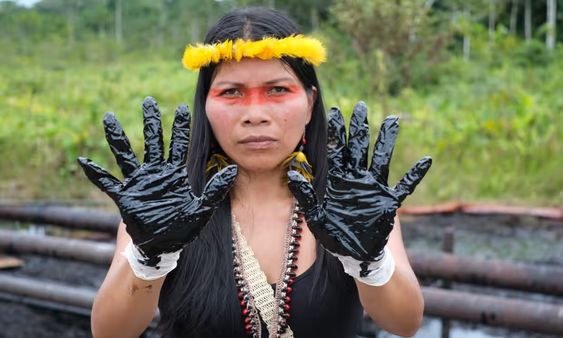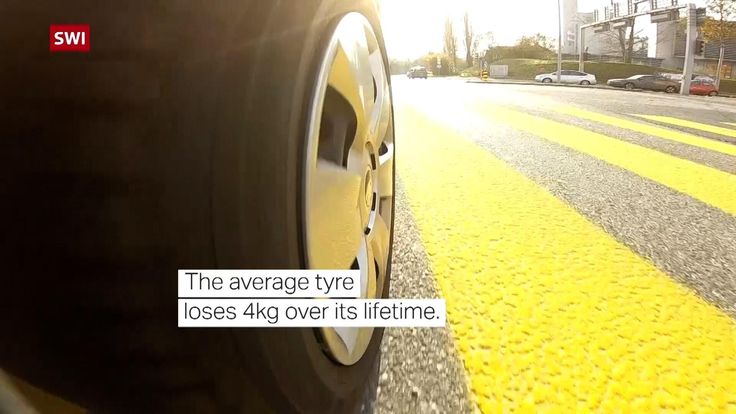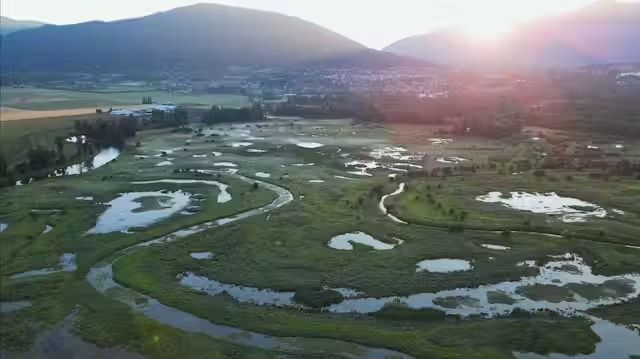The referendum outcome permanently protects one of the world’s most biodiverse places, marking a major victory for Indigenous rights, rainforest conservation & global climate.

Photo: Sophie Pinchetti/Amazon Frontlines
This is my message to the western world – your civilisation is killing life on Earth
Nemonte Nenquimo

Puyo, Ecuador, August 21st, 2023 – On Sunday, August 20th, 2023, in a historic referendum held during the first round of the presidential elections, Ecuadorian citizens massively voted in favor of keeping over 726 million barrels of oil underground in the Yasuní National Park deep in the northern Amazon Rainforest, one of most biodiverse regions on the planet and home to two of the world’s last Indigenous communities living in voluntary isolation.
At a time when the climate crisis intensifies around the world and the Amazon rainforest fast approaches an irreversible tipping point, the referendum sets a global precedent for the democratization of climate politics. Nearly 60% of the population voted to halt oil drilling, making Ecuador become the first country in the world to determine the limits of resource extraction through a referendum, putting the decision over the fate of the Yasuni rainforest to citizens instead of politicians and corporations.
The binding sentence permanently bans oil drilling in the Ishpingo-Tambococha-Tiputini (ITT) oil project, located on the eastern edge of the Yasuní National Park, where state oil company Petroecuador currently produces more than 57,000 barrels of oil per day, approximately 12% of Ecuador’s oil production. The Ecuadorian government is required to halt the operations and dismantle infrastructure within one year, as well as carry out remediation and reforestation. The decision comes as a major blow to the fossil fuel industry, the biggest driver of climate change, which has operated with impunity and polluted millions of acres of Indigenous rainforest territories in the country for over half a century.
The Ecuadorian people’s decision to leave oil underground in Yasuni marks a major victory for Indigenous rights, rainforest conservation, and the climate. The decision permanently protects nearly 2,000 hectares of Amazon rainforest and safeguards the ancestral homeland of the Waorani people and their relatives living in voluntary isolation, the Tagaeri and Taromenene communities. By banning oil extraction in this area of the Amazon, 345 million tons of carbon will also be prevented from being released into the atmosphere.
Grassroots movements in Ecuador are increasingly positioning the South American nation at the vanguard of climate solutions and global resistance against extractivism. Ecuador was the first country in the world to recognize the rights of nature in 2008. The Yasuni referendum also builds on the 2019 landmark win of the Waorani Indigenous people protecting half a million acres of primary rainforest territory from oil drilling.
The referendum is the result of over a decade of grassroots organizing and legal battles.

In May, the country’s Constitutional Court authorized the vote to be included on the ballot of the election. In the months leading up to the vote, Indigenous and non-Indigenous activists and organizations led campaigning efforts through mobilizations, assemblies, and digital media. Over the past month, the campaign has garnered worldwide attention, with numerous international celebrities and activists pronouncing themselves: Leonardo DiCaprio, Mark Ruffalo, Greta Thunberg, Jada Pinkett Smith, Jason Momoa, Leonor Varela, Gael Garcia Bernal, among others.

Created in 1979, Yasuní National Park – a biodiversity epicenter located at a geographical crossroad at the intersection of the Andes, the Amazon, and the Equator – is central to the future well-being of the entire planet. Since oil drilling began in 2016 under the administration of former President Rafael Correa, over 689 hectares of rainforest in Yasuní have been degraded by the oil industry, the equivalent of 1,200 American football fields. In addition, 23 detrimental oil spills have been recorded within the ITT, as well as a marked expansion of the agricultural frontier and illegal hunting from the construction of new roads.
By eliminating one of the country’s most significant oil fields, the vote for Yasuni also poses a significant challenge to Ecuador’s oil-dependent economy and accelerates the debate about the country’s transition towards a fossil-fuel free future. Public opposition against oil drilling also tarnishes the nation’s reputation and image in the oil industry, discouraging future investments.
As presidential elections head to their second round in October, Ecuador faces monumental challenges ahead. The forthcoming administration will need to grapple with a crippled economy, rising poverty, and an unprecedented insecurity crisis wrought with political violence and organized crime. The limitation on oil drilling is also susceptible to making other oil-rich Indigenous territories subject to increased targeting and illegal activity such as mining, logging, and poaching become more rampant.
In the coming months, campaign organizers and the Indigenous movement will work to ensure compliance with the sentence, use the precedent to boost efforts for permanently protecting the Amazon rainforest and climate-critical Indigenous territories and advocate for a just transition away from fossil fuels.
Declarations from Indigenous leaders and campaigners:
Leonidas Iza Salazar, President of CONAIE:
“The Ecuadorian people have added their grain of corn for the world, and with this victory, they have lit a spark from this territory for the world to see. This victory shows that humans are taking action to save our planet during these times of climate crisis. Through this referendum, we have saved Yasuni in the heart of the Amazon rainforest, the home of Indigenous peoples. As Ecuadorians, we are paving the way to solve the problems we face as humanity. We hope other countries around the world see this triumph and our message so that other citizens can also exercise their rights and use direct democracy to save lives, save the forest, save nature, and ourselves as humans. We call on other countries to unite; we must all unite to safeguard human life and our Mother Earth; she is the only home we have!”
Pedro Bermeo, Founding member of Yasunidos:
“The outcome of this referendum is a victory for all Ecuadorians. It shows us that the greatest national consensus at this time is in the defense of nature, Indigenous peoples and nationalities, and life. The majority of Ecuadorian society believes that Yasuní, the most biodiverse place on the planet, must be protected, that the millions of animals that live in this sacred space should be protected and that the lives and rights of Indigenous peoples, including communities living in voluntary isolation, must be respected. The fight isn’t over; even if politicians separate us, nature unites us, and we will work together to ensure the government complies with the will of the Ecuadorian people.”
Nemonte Nenquimo, Waorani Leader & Goldman Prize Winner:
“Today is a historic day! As a Waorani woman and mother, I feel overjoyed with Ecuadorians’ resounding decision to stop oil drilling in my people’s sacred homeland. Finally, we are going to kick oil companies out of our territory! This is a major victory for all Indigenous peoples, for the animals, the plants, the spirits of the forest, and our climate! I know our ancestors who cared for the forest for thousands of years are also rejoicing; they have been speaking through us during this struggle. Yasuni gives life to our world, and Ecuadorian society has finally woken up to this and voted to protect the forest and respect nature! They have finally listened to our voices as Indigenous peoples! We have lived with the consequences of over half a century of oil exploitation, which hasn’t brought any development. It has only destroyed nature, our territories, our cultures. People are now realizing the crises we face aren’t going to be solved by exploiting more oil. It’s about respecting Mother Earth and uniting to create a better world for our children for future generations! Ecuador is showing to other countries that another world is possible!”
Mitch Anderson, Executive Director of Amazon Frontlines:
“In one fell swoop, the Ecuadorian people struck a mighty blow to the oil industry, protected one of the most biodiverse forests in the Amazon, and showed the world what grassroots climate action really looks like. People power is the answer to the climate crisis. A big question for me is where countries like the United States and the UK would land on a vote like this?”
Additional Resources:




Comments are closed.